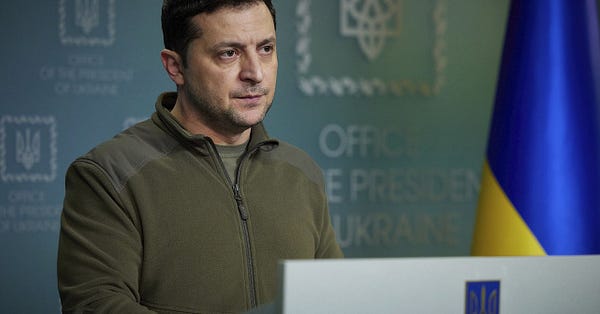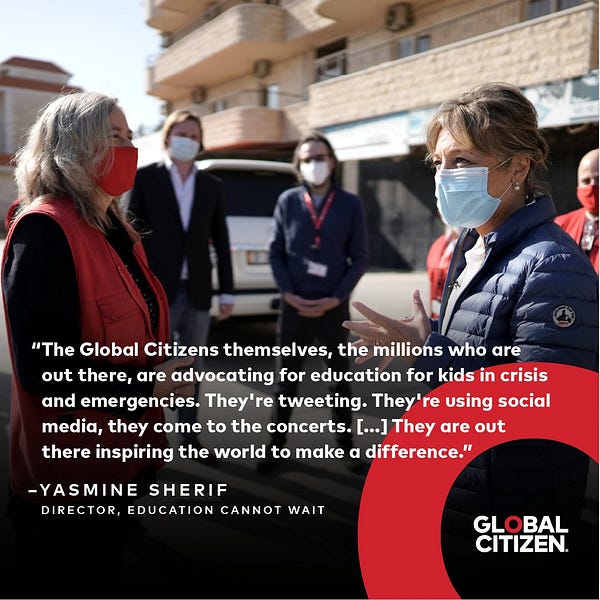Zelensky, Global Unity & Solidarity
Zelensky declares to US Congress that ongoing support "is an investment in global security and democracy."
I’m writing this while watching coverage of President Zelenskyy’s meeting with President Biden and his historic address of Congress. There is little doubt in my mind that this man is more than deserving of being named Times’ Person of the Year as the standing ovation Congress gave him attests. His declaration that ongoing support “is an investment in global security and democracy” is spot on. War, in any guise, pushes the world backward, distracts from other key challenges, and, as we’ve seen this year, pushes more people into poverty and hunger.
The outpouring of support and solidarity, at least from some countries, towards Ukraine has been inspiring. For my part, earlier this year the organisation I work with Global Citizen organized an entire 24 hour social media rally with 100+ of the world’s biggest artists which helped lead to $10+ billion in humanitarian commitments from governments, companies and foundations.


The question on my mind, as we end 2022, is how do we foster a similar kind of global solidarity for other key global challenges, ranging from climate change to ending poverty? This surely too is an investment in our collective security and democracy. Our failure though to treat these challenges with the same degree of compulsion is what, understandably, has alienated and agitated so many in the Global South.
It is easy to see why. On the one hand today’s Omnibus bill passed by Congress had some important investments for overseas humanitarian assistance. I’m personally glad it provides a $5 million funding increase for the incredible organization Education Cannot Wait, which is working to provide millions of children in disaster prone or conflicted affected regions with education.


Yet, the Congress has also just offered only $1 Billion for climate assistance, falling short of Biden’s pledge to eventually provide over $11 billion annually to help poorer nations adapt to and mitigate climate change. Many developing countries will see this as a further breach in trust and a failure for the West to live up to their promises.
This is a theme I’ve written consistently on throughout this year and here are some highlights and key takaways. If you would like to read more please continue to subscribe and share this newsletter! 2023 will presented new opportunities to campaign for the kind of global solidarity the world needs right now.
What Can We Learn From Zelensky’s Global Campaign For Justice?
As we marked the International Day of Multilateralism earlier this year, I was fortunate to recently sit down with Maaike de Langen of the NYU Center on International Cooperation to explore this current state of leadership in global governance, including what has and has not been working, and how the outpouring of support that Zelensky has been able to stir amongst governments and individual citizens alike could be emulated and applied to address some of the other big challenges of our time.
As Maaike answered one of my questions: The illegal invasion of Ukraine is demonstrating the failings of the intergovernmental system. But it is also bringing it back to life in unexpected ways. Security Council meetings are once again airing on TV screens across the globe, the Secretary-General is being publicly criticized, a renewed proposal for veto reform has been submitted. So suddenly we see a lot more of the UN, but what we see is this old-school multilateralism.
To me, multilateralism is about more than the diplomats and UN staff that inhabit the New York bubble. Because the New York-based multilateral process at the UN has governments as its primary actors, while in reality, of course, states are not monoliths. When a new government takes over, it doesn’t change who the people of that country are. People living in authoritarian countries are not responsible for the misdeeds of their leaders.
#Uniting For Peace: Hope For Ukraine, Hope For The World?
I watched aghast at images of suffering in Afghanistan only to get frustrated by the lack of empathy they provoked in Washington. Indeed, the invoking of “Uniting For Peace” against President Putin’s invasion begs multiple secondary questions: if leaders can call an emergency session and take swift action when guns are firing in one particular corner of the world, why do we not see the same urgency to end the war on the planet signified by climate change and environmental degradation? Why is it, two years on in a global pandemic, we have not ended the war on global health by uniting for vaccine equity? Will this moment of broad unity unlock cooperation elsewhere?
Perhaps the answer to this last question, in the fullness of time, will be a resounding no. And yet, there are rare moments in history where the Overton window - that is to say the range of policies politically acceptable to the mainstream population at a given point in time - is blown ajar and the impossible becomes possible. What if the same might be true as it relates to our system of global governance when it comes to addressing humanity’s shared challenges such as climate change, war and poverty? As no less than Lenin once said “there are decades where nothing happens; and there are weeks where decades happen.”
And for an example of a leader trying to exploit the Overton Window in new innovative ways and create a new kind of global solidarity, check out this profile I did earlier this year of the inspiring Prime Minister Mia Mottley of Barbados.
Mia Mottley, The Leader Disrupting Global Financial Institutions In The Name Of People And The Planet
A shining example of a transformational world leader, Mottley is inspiring ordinary citizens to act together and use their voices to disrupt the status quo of global governance systems in a movement to defeat poverty, defend the planet, and achieve justice for all, NOW.
“We’re at a stage right now where everything causing us challenges is global,” Mottley told her audience in New York. “So if we can link between individual action and global consequences then we’re going in the right direction.”


